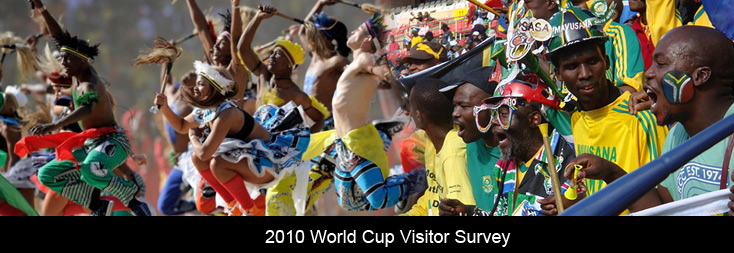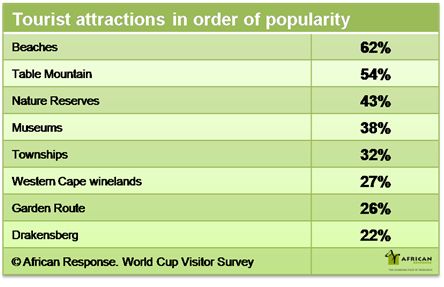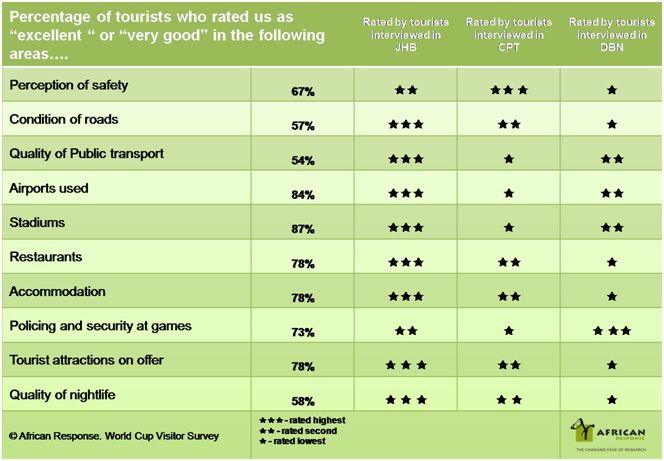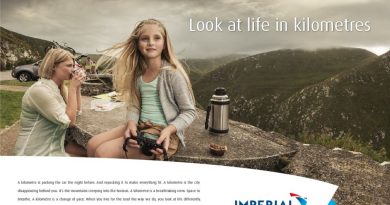2010 World Cup Visitor Survey: 92% would recommend South Africa
BRYANSTON – Nine out of ten foreigners visiting South Africa for the purposes of the World Cup say that they would recommend South Africa to friends or family as a holiday destination, according to African Response’s World Cup Visitor Survey.
The survey included 722 tourists, interviewed in Johannesburg, Cape Town, Durban and Pretoria and investigated perceptions of the various elements of the South African experience, including roads, accommodation, stadia, policing and safety, amongst others.
“Post World Cup press has been very positive about the success of the tournament and its implications for tourism and foreign investment. It is very pleasing to see our survey confirming this view.” states Beatrice Kubheka, Managing Director of African Response. “African Response has been tracking the perceptions of readiness leading up to the 2010 World Cup since 2006 and witnessed doubt slowly becoming confidence the closer we got. But having 92% of visitors saying that they would recommend South Africa as a destination is more than we bargained for and is great news for our future.”
Those whose stay lasted between a week and two had a slightly higher tendency to recommend SA – at 94%. However, propensity to recommend SA to friends or family was as high as 92% amongst those tourists who were staying in the country for over a month.
Asked if they themselves would return, an overwhelming 96% of visitors said there is a possibility that they would and the remainder (4%) said that they would prefer to visit somewhere they have never been before.
Where did they visit?
African Response asked our guests where they had visited during their stay in South Africa to get a sense of the most popular tourist attractions. The most popular were the beaches and surprisingly, a third of those interviewed had visited townships too, surpassing those that were interested in visiting the Western Cape Winelands, Garden Route or Drakensberg.
Length of stay: A third of the World Cup visitors were staying in SA for more than a month, while 48% indicated they were here between 2 – 4 weeks. Only 13% were here for between 1 and 2 weeks and only 4% under a week.
Stadiums get thumbs up
Respondents were asked to rate a number of elements contributing to the overall experience they had in South Africa. Our stadia were undoubtedly rated the highest with 87% of respondents rating their perception and experience at the stadiums as “excellent” or “very good.” Tourists interviewed in Jo’burg gave the highest rating at 91% – no doubt a result of the impressive Soccer City, while those interviewed in Durban and Cape Town gave the stadia 84% and 78% respectively.
Of the tourists interviewed, 94% attended live matches at the stadiums. The majority of them (37%) attended more than 5 matches. Only 8% attended only one match with 54% attending between 2 and 4 matches live.
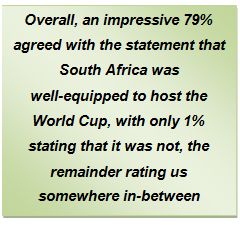 “There was no significant difference in stadia rating amongst those who had attended many games versus those who had attended only one.” stated Kubheka. “This is good news as it means that a consistently high standard was maintained across the tournament.”
“There was no significant difference in stadia rating amongst those who had attended many games versus those who had attended only one.” stated Kubheka. “This is good news as it means that a consistently high standard was maintained across the tournament.”
The guests identified public transport and nightlife as the areas in most need of improvement. Public transport was rated excellent or good by only 54% of tourists and nightlife by only 58%. The nightlife was least impressive in Durban, according to our guests.
Joburg residents will be pleased to notice that tourists interviewed in Joburg gave the highest ratings across almost all of the attributes mentioned, whereas Cape town impressed tourists on the perception of safety and Durban on their policing and security at the games. “This may be due to the fact that approximately 75% of the World Cup activity happened in and around Joburg, meaning visitors were more familiar with this city.” states Kubheka.
BZZzzzzzzzZZZZzzzzzz bzzzz bzZZzzz
{Note the sample for this section was 300 as this question was introduced halfway during fieldwork}
“Vuvuzela” has been nominated as the word of the tournament and love them or hate them, they played a huge role in differentiating the South African event to the many World Cups that have gone before. African Response asked 300 tourists how they felt about the plastic horns. The vast majority (80%) agreed that vuvuzelas add atmosphere to the game, and 20% disagreed with the statement.
When asked whether the vuvuzela should be used at all future matches, two thirds of respondents agreed that they should.
Interestingly, females showed a higher affinity for the instruments than men did, 86% of females interviewed stating they add atmosphere and 70% believing they should be used at future matches.
Controversial Decisions and the question of technology
{Note the sample for this section was 300 as this question was introduced halfway during fieldwork}
Given a few widely publicised controversial decisions by the match officials during the tournament, African Response asked 300 of the tourists interviewed just what they thought of the officiating during the tournament and their opinions of technology to aid decisions. While press and public opinion for introducing the new technology has been prolific, there are varied opinions amongst some of the soccer fans present at South Africa’s tournament this year.
46% of those interviewed stated that the quality of officiating during the World Cup was “excellent” or “very good” while 19% stated it was very poor, the remainder rating it somewhere in-between.
Over half of the tourists interviewed agreed that FIFA should make use of technology to support on-field officiating, with 11% disagreeing with the statement. The highest support for technology came in the arena of the offside rule where 58% believe that technology could be used to confirm or negate offside decisions.
In considering whether technology has a role to play in cautions, 55% of respondents indicated that technology should be used on field to confirm whether red or yellow cards were fairly shown to a player and that technology should be used after matches to allow a player’s appeal against a match ban to be reviewed again and either confirmed or nullified.
Forty percent of soccer fans interviewed believe that introducing technology will only slow down the game and a further 49% believe that players should be content with decisions and not argue them as the referee is the only one responsible for on-field decisions. This sentiment was expressed further with half of the respondents agreeing that all international football matches’ including the FIFA World Cup’ will be fine without having to introduce television refereeing or additional technology.
About the survey
This survey was conducted using a face-to–face intercept method with 722 tourists who had travelled to South Africa for the purposes of the 2010 World Cup. Respondents were interviewed in Johannesburg, Cape Town, Durban and Pretoria between the dates of 11 June 2010 – 13 July 2010.
Also view:
About African Response
African Response is the most empowered, black owned, black managed research agency in South Africa. Established in an equity relationship with Synovate, we offer a full complement of research skills.
African Response prides itself upon an exceptional ability to understand and interpret the needs of the South African black urban and rural consumer. We offer clients customized qualitative and quantitative research, innovative ideas and practical solutions. African Response’s vision is to significantly improve clients’ business performance and to achieve excellence through utilization of the wide knowledge and experience of our partners.
More information can be found at www.africanresponse.co.za

